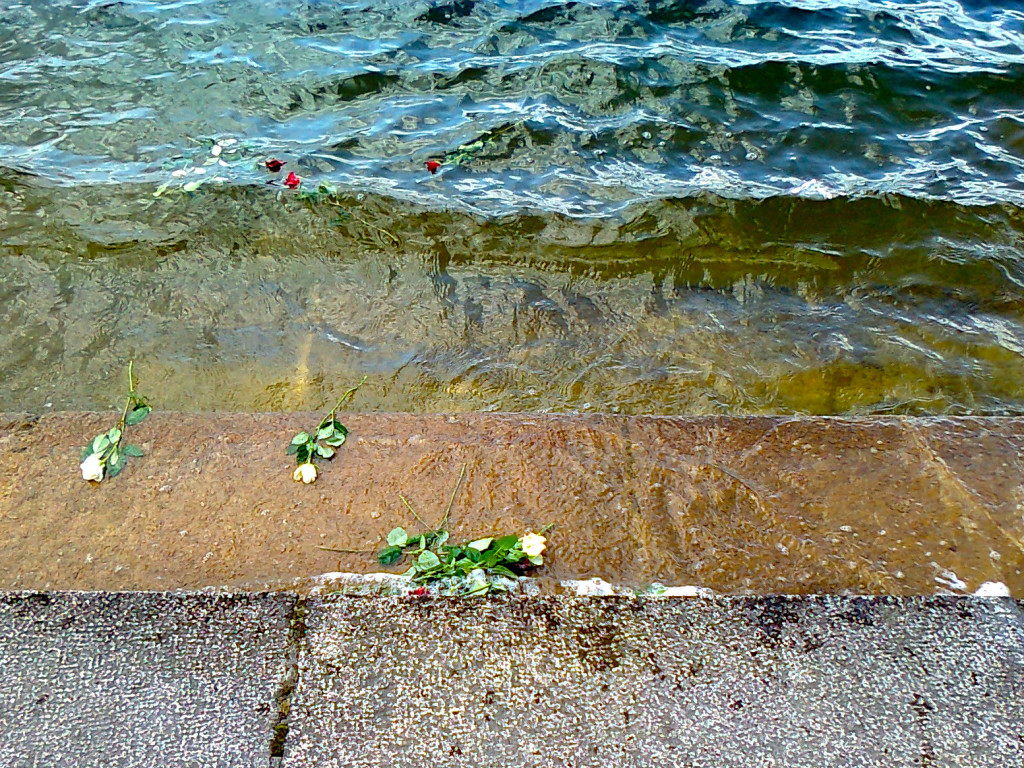Victory in Europe, Defeat in Berlin

This past week marked the 70th anniversary of the end of the war in Europe, and in Berlin the city is remembering the occasion with a series of events called “Spring in Berlin”. Choosing simply the time of year when these events occurred in 1945 is a careful choice, because of how difficult it is to remember war in the city of the defeated.
Does one focus on the local history?: the massive destruction of Berlin’s infrastructure, the armies of flies and rats, the stench from buried bodies, the populace trapped underground in tunnels and flak towers, the looting and raping by Soviet troops, the German forced recruitment of children and the elderly into ill-fitting uniforms, deserters shot and hanged from lampposts? Does one focus on the numbers: a quarter of the city in ruin, the population reduced by half, 100 000 civilians dead, 100 000 women raped (a conservative number), the million German military casualties, or the quarter of a million Soviet army dead? Does one remember the 12 million Germans who lost their homes East of the Elbe or the vengeful firebombing of beautiful cities like Dresden late in the war?
How does one weigh these terrors with the more significant wider context?: the liberation of the Nazi death camps, the news reels carrying images internationally of millions of Jews slaughtered, among other victims chosen for their religion, race, nationality, sexuality, or political convictions. Does one focus on the liberation of an occupied, collaborationist, starved Europe? On the defeat of a murderous ideology, based on pseudo-science and military expansion?
The commemoration dilemma for Berlin, and for Germany, is the tension between local and wider contexts, and how much one is allowed to mourn one’s own dead given how much Germany committed wrong.
Was May 1945 defeat or liberation for the Germans? In material terms and lives lost, there have been fewer more ‘total’ defeats in history. Hitler issued his Nero Order on 19 March 1945: Germany would fight to the last man rather than face the indignity of surrender as in the First World War. This decision meant Germans could more easily be seen as victims of their own dictatorship. The Allied troops liberated the Germans from themselves: certainly Germans were delighted to see American troops at the war’s end. They were rather less happy to meet the Soviets, as they did in Berlin in late April.
It is a complex teleology. Because Germans today have been denazified, because they see clearly what life would have been like had the “good war” been lost to Hitler, they cast current aspirations and sensibilities into the past, preferring to see themselves as “liberated” rather than defeated (89% in a recent poll). Indeed, it is still controversial for the City of Berlin to utter the words “defeat”. This when many historians argue for the complicity of ordinary Germans in the savagery of Nazism, an argument which would make that generation forever the enemy, excluding them from spinning 1945 as a liberation from the perfidy of their own dictatorship, or as a victory of German Socialism against German fascism (as it was taught in the GDR). The continued reticence about “defeat”, and focus instead on “liberation” (in the Socialist press: Neues Deutschland’s front page on 7 May) or a “new beginning” (in the more mainstream press: Süddeutsche Zeitung’s headline), was clearly seen in the German public sphere last week. It is clearer now why the ceremonies and exhibits in Berlin these have been uncontroversially dubbed by the time of year, “Spring in Berlin”.
Yet, the memory of the ugliness of defeat is never far below the surface. This was seen in the justifiably wary reception of a pro-Putin gang, the Night Wolves, who, on motorcycles, followed the route of Soviet soldiers towards Berlin, celebrating over the bones of dead Soviet youth at the memorial in Treptow. I found Berlin strangely quiet these past weeks, simply wanting this uncomfortable moment to pass, watching the banner of the hammer and sickle race by fluttering from a rental car in silence, or stoically cleaning up the trash from the Russian revellers in Treptow the next day. Anyone who has visited Berlin is stunned by the cost of the war, by fact the city is still rebuilding. Berliners too are shocked by the brutality visited on them, and the brutality of their ancestors. Is it surprising they can’t quite bring themselves to celebrate?
